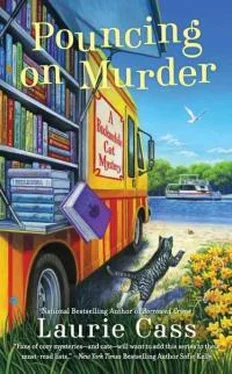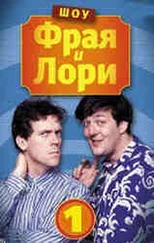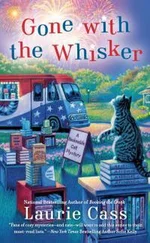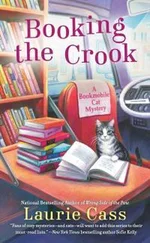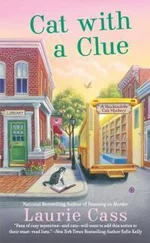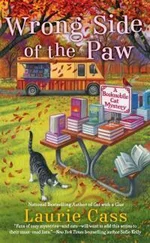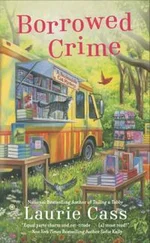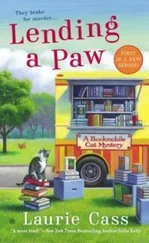As I watched, the line of black clouds rushed past the sun, turning the evening’s soft glow to darkness in a matter of seconds.
“Oh, jeez . . .”
I dumped Eddie onto the floor and ran outside. “Eric!” I shouted. “Eric, are you in there?” I didn’t wait for an answer, but rushed about my small foredeck, picking up seat cushions and feeling a little like Dorothy when the tornado was headed straight for Auntie Em and Uncle Henry’s farmhouse. “Eric!”
“Hey, Minnie,” he said, poking his head outside the side door of his boat. “What’s up? Need a doctor?” He grinned.
I pointed westward. “Storm’s coming. Better batten down your hatches.”
He laughed. “I’m not sure I have any. Or that I’d know what one would look like if—” A gust of wind tore his words away, sending them east at about thirty miles an hour. “Good Lord,” he said, or at least that was what I imagined him saying, because I couldn’t hear a thing he said over the noise of the wind and waves.
“Will you be okay?” he shouted, pointing at my boat, which suddenly seemed very tiny.
Clutching my cushions to my chest, I nodded. My boat had seen decades of storms, including the famed summer storm of 1968. Of course, I’d never been on board during a big one, but it was too late to do anything about that now.
Crack!
Eric and I both jumped as lightning struck Janay Lake. Electricity sizzled in the air, and I didn’t even reach a count of three before the thunder boomed.
“Inside!” Eric shouted.
But I was already halfway through the door. I didn’t need some surgeon to tell me to stay inside during a wind-driven lightning storm.
“Mrr!”
I dropped the cushions on the floor and picked up my cat. “Sorry, pal, but I’m afraid it’s going to be a wild night. Thunder and lightning and wind and—”
Crash!
Somewhere outside, a tree thumped to the ground. I hoped it wasn’t the big maple outside Rafe’s house. With the wind, that tree could easily have fallen straight onto the front porch.
The houseboat rocked back and forth and up and down. I sat at the dining bench, told myself that we were tied up firmly to the dock at four corners, and snuggled Eddie close. He didn’t purr, but he didn’t pull away, either.
We stayed like that, waiting for the storm to pass. The electricity went out thirty minutes later and I carried an unprotesting cat to bed.
Soon enough Eddie was purring, and then snoring, but I lay awake for hours, listening to the wind and the lightning and the thunder.
Chapter 19
I fell asleep at some point during the night, but when morning finally came, I felt as if I hadn’t slept at all. Fatigue filled my eyes, and my arms felt twice their normal weight.
Of course, that could have been because I was lying on my side and Eddie was flopped across both of my arms.
I kissed the top of his fuzzy head and slid out from underneath him. “Thanks for staying with me,” I whispered. The night had been grueling, but at least I’d had the comfort of a cat to keep the worst of my fears at bay.
Now, however, I had to face those fears.
Fear number one, that there’d no electricity and I’d have to go to the book fair unshowered and grungy, was happily untrue. The bathroom light went on, I had hot water, and in a few minutes I was dressed and blotting as much dampness as I could out of the curly mess that was my hair.
I trotted up the stairs to the kitchen and steeled myself to look outside and face fear number two.
“Oh, wow . . . ,” I whispered.
The world was a mess. Branches had been ripped from trees and tossed headlong. Leaves were strewn everywhere. Garbage cans, lawn furniture, bright plastic children’s toys, and tarps had been blown hither and yon, reminding me somehow of a game I’d played as a kid when everyone took off their shoes and put them in a pile.
I tossed down a bowl of cereal, grabbed my backpack, and hurried outside.
Eric was on his boat’s deck, sweeping it free of rain and leaf debris. “Made it through the night, I see.” He paused in his sweeping to smile at me. No hard feelings for turning him down, apparently, which was nice. “Did you get much sleep?” he asked.
“Not much,” I said, stepping onto the dock. “And there’s a book fair at the library today. Trock Farrand’s signing his new book.”
“If I buy a copy, do I have to learn how to cook?” Eric asked.
I grinned and waved as I started a fast walk toward downtown. But there was one quick stop I had to make before heading to the library.
Rafe was standing in front of his house, hands on his hips, surveying the damage.
I walked up and stood next to him. “Well,” I said. “It could have been worse.” Because while a massive branch had ripped off the maple tree in front of his house, the branch had mostly missed the porch, and most of the tree was still standing.
Rafe nodded. “Yeah, and I was just thinking the other day that I should have done that trim a different way.”
“Well, there you go.” I almost asked him if he was going to come to the book fair, but I doubted he’d be able to tear himself away from his new project. I said good-bye, he grunted a reply, and I hurried off.
The closer I got to downtown, however, the more worried I got. Each block I walked showed increasing amounts of destruction, and by the time I reached the heart of the retail district, I realized there was no electricity. No signs were lit, no shop windows glowed, no welcoming anything anywhere.
This wasn’t good. At all.
Without thinking about it, my fast walk turned into a slow jog. My brain’s worrying cells, the ones I tried to keep quiet and inactive, flared bright and strong and, try as I might, I couldn’t force them back into hibernation.
So I ran.
I ran through the far end of downtown, up the short hill, and left two blocks, feet flying, arms pumping, backpack thumping, breathing hard and fast, my lungs burning with the unaccustomed exercise.
There were no signs of electricity two blocks away from the library . . . no electricity one block away . . . leaves and tree branches everywhere, loose shingles in front yards, lawn furniture a tangled mess . . . and then I reached the library.
Panting and wheezing, I came to a dead stop. I stared at fear number three and it stared straight back.
The book fair tents, Gordon’s tents, were a flattened mess. Not a single one remained standing. A tree had fallen across the largest, and its two peaks, formerly graceful and sweeping and reminiscent of castles and fairy tales, were on the ground, their magic gone.
I took one step toward the disaster, then stopped. There was nothing I could do. Nothing anyone could do. Tent poles were snapped, stakes were yanked out of the ground, canvas was ripped. Even if all the equipment had been intact, it had taken a full day to set everything up, and we didn’t have that kind of time. What we had—what I had—was two and a half hours.
My knees went a little jellylike. I wanted desperately to sit down or, even better, to go find a quiet dark corner and some chocolate chip cookie dough, and not come out until it was gone.
Instead I took a deep breath, pulled out my phone, and starting making calls.
• • •
Half an hour and a lot of fast talking later, I took my cell phone away from my ear and hoped that none of those urban legends about heavy cell phone use causing cancer had any truth to them.
I put my phone in my backpack and stood there for a moment, thinking and not thinking at the same time, which should have been impossible but clearly wasn’t, since it was happening to me. For every thought I had, there was an equal and opposite reaction of blankness in my brain. If I thought about the vast number of people who needed to be contacted in the next two hours, the next thing that went into my head was a large bubble of nothingness. Self-defense, probably, but it wasn’t helping me get things done.
Читать дальше
